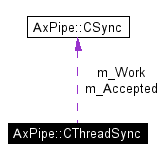
#include <CSync.h>
Collaboration diagram for AxPipe::CThreadSync:

Public Member Functions | |
| CThreadSync () | |
| Initialize sync objects. | |
| ~CThreadSync () | |
| Clean up. | |
| void | WorkStart () |
| Initiate one Work() cycle - called from outside worker thread. | |
| void | WorkSignal () |
| Signal that we've prepared for more Work() - called from outside worker thread. | |
| void | WorkWait () |
| Wait for more to be ready for Work() - this is called in the worker thread. | |
| void | WorkEnd () |
| End one Work() cycle - called from the worker thread. | |
Private Attributes | |
| HANDLE | m_hSemaphore |
| Enable serialization of requests for processing, can't use a Mutex, as it's sometimes the same thread we need to control. | |
| CSync | m_Work |
| Signal when worker has work to do. | |
| CSync | m_Accepted |
| Signal when worker has accepted signal. | |
Threads often need synchronized access to shared data, and control the the passing of the data. This class implements methods for this under a 'work' paradigm. Thread A wants to pass off a piece of work in some form of shared medium, i.e. shared memory for example, to thread B. The sequence is then: A B ... WorkWait() ... WorkStart() WorkSignal() ... WorkEnd()
The methods ensure that when WorkStart() returns, no other thread is between WorkStart() and WorkEnd(). It's also guaranteed that when WorkSignal() returns, thread B has received the signal via WorkWait(). Owneship of the shared resource passes from A to B upon return from WorkSignal() and WorkWait() respectively. Thread B relinquishes it's hold, upon call to WorkEnd(), and as previously noted Thread A get's ownership upon return of WorkStart().
Definition at line 75 of file CSync.h.
 1.3.5
1.3.5